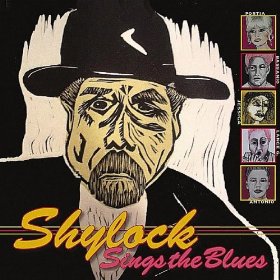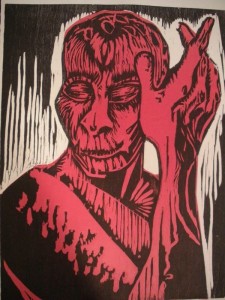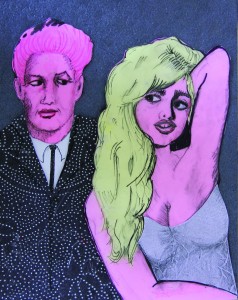Music Review: Shylock Sings the Blues
This daring, musical version of The Merchant of Venice provides a fascinating re-imagining of a classic play that explores many of the themes and tropes of the original more deeply than many modern productions do.
Shylock Sings the Blues by The Venetians. Lyrics by David Sokol. Music by Dennis Willmott. Produced by David Sokol. Shylock Sings the Blues is available at David-Sokol.com and at CD Baby.
By Ian Thal
Few aficionados of Shakespeare cite The Merchant of Venice as their favorite play. It is rarely ranked with Hamlet or King Lear amongst the Bard’s greatest works of dramatic poetry nor lumped in with such popular favorites as Romeo and Juliet, The Tempest, or A Midsummer Night’s Dream. Despite its origins as a romantic comedy, “The most excellent hiƒtorie of the merchant of Venice. With the extreame crueltie of Shylocke the Iewe towards the ƒayd merchant, in cutting a iuƒt pound of his fleƒh” unwittingly provides a savage critique of Western civilization through its dramatization of anti-Semitism. Unsurprisingly, The Merchant of Venice has consequently become, for many, the most controversial play in the Shakespeare canon.
It is this controversy that arguably makes it among the most important of the Bard’s plays. After the crimes of the Holocaust, it not only reminds audiences that old prejudices have led to government-sanctioned mass-murder but that this ancient hate has a history as a form of entertainment. Many bardolators are troubled by the fact that Elizabethan audiences, most of whom had never encountered a Jew (to use a modern term, England had been “ethnically cleansed” of Jews some three centuries prior), would have seen Shylock as a comic villain. Also, over the subsequent centuries, most European audiences would have seen Shylock as a representative of the Jewish people. Thus defenders of Shakespeare have attempted to anachronistically paint the dramatist as a progressive liberal advocate for tolerance and pluralism, often at the expense of ignoring how the story draws upon anti-Semitic folklore and the anti-Judaic theology that was part of the liturgy of most Christian churches up until the twentieth century. Others have simply dismissed the work as anti-Semitic: indeed more than once I have heard friends say, “I hate that play.”
It is only natural that some artists would draw on the cultural mystique of The Merchant of Venice as source material for their own work. Burlington, Vermont-based lyricist and illustrator David Sokol (who did all the album art) and composer Dennis Willmott replace Shakespeare’s iambic pentameter and prose with blues, rock, and country songs in a concept-album entitled Shylock Sings the Blues. The story has been shifted from the Venetian Republic of the sixteenth century to 1950s Venice, New Jersey. Of course this irreverence is also a nod towards tradition: Shakespeare’s original play is believed to have drawn heavily on such source material as the tale of the Florentine merchant Bindo Scali and the unnamed Jew in Giovanni’s Fiorentino’s Il Pecorone or “The Ballad of the Crueltie of Geruntus” featuring the Jewish Geruntus and the unnamed Italian merchant.
In the New Jersey of Shylock Sings the Blues, Italian-Americans and Jewish-Americans are pit against each other: living as neighbors but seeing each other as aliens, clinging to suspicions and prejudices. While Shakespeare’s Antonio is a merchant prince with all his ships out at sea, Sokol’s Tony is a mafioso whose liquid assets are tied up in a major drug deal. Given the original Antonio’s complicity in robbing Shylock’s house, recasting him as a gangster is far more convincing than the legitimate businessman portrayed in most productions set in the twentieth and twenty-first centuries.
The Devil, who figures prominently in the blues repertoire, also appears in the songs, underlining a theme that is often lost on contemporary critics, scholars, directors, and dramaturgs when they write about Shakespeare’s play. The Christian characters may be sinners, but salvation is still open for them. Shylock as Jew is associated with the Devil (he may even be “the Devil incarnate”) and thus an enemy of God. However flawed the Christian characters might be (even the Mafia-affiliated believers in Shylock Sings the Blues), it is their duty as Christians to hate and humiliate Shylock. Modern productions of Shakespeare’s play often miss this, but Sokol’s lyrics make that point clear, as in Lance G.’s talking blues, “The Devil Told Me.” The tune not only updates Launcelot Gobbo’s dialogue with the Devil, his conscience, and himself but also dives into modern anti-Semitic conspiracy theories about Jewish world domination and presumed wealth and power. Sokol underlines the connection between sacred and secular bigotries.
You guys make the money
and you guys got the fame
for all the world problems
you guys got the blame.
You got greed and avariceAnd world control
You got banks and TV and you
you got radio
You got media and expedia
and private jets abound
you got limos and Maseratis
and I take the bus to town.
There are challenges to Sokol’s daring approach. The musical’s cast of characters are taken on by two vocalists (Dwight Ritcher as Shylock, Bassanio, and the Devil; Nicole Nelson as Tony, Portia, Jessica, and Lance), and there are few if any direct quotations from Shakespeare’s text. Still, listeners who know The Merchant of Venice will have no problem identifying the characters and scenes within the first few lines of any song. In “Gold and Silver Boxes and a Box Made Out of Lead,” Portia lays out the stakes to Bassanio via an alchemical analogy—and, as in the play, she uses multiple rhymes for lead to make Bassanio gets the right idea.
Other songs serve to update the characters in ways that are justified by Shakespeare even though they introduce a modern twist: “Jessica’s Song” is a teenage rebellion rocker that shows Shylock’s teenage daughter relishing the anti-Semitic taunts she throws at her father. She does not merely want to assimilate into a mainstream, American life-style—she wants want to run it into dear old dad that she has “a Christian boy.”
The Shylock of Shylock Sings the Blues, is a passionate avenger, raging against the bigotry of the gangsters. He takes the bond hoping to confront his tormentors with their hypocrisy: his signature songs, “Shylock Takes the Bond” and “Pound of Flesh,” are accompanied by dissonant, Delta-style slide guitars. In Shakespeare’s play, Shylock exits defeated, the final act reserved for the victors to celebrate their triumph. In Sokol’s version, Shylock addresses God with the more contemplative “Done with all my Ragin,'” which is accompanied by a lilting, country steel-guitar. He has taken his shot at the enemy—this Shylock is content.
Shylock Sings the Blues abounds in strong songwriting held together by a resonant concept that modernizes a centuries old story. The musical provides a fascinating re-imagining of a classic play that explores many of the themes and tropes of the original more deeply than many modern productions do. Hopefully there will be an opportunity to see it on the stage.
Tagged: David Sokol, Dennis Willmott, Shylock Sings the Blues, The Merchant of Venice, The Venetians



